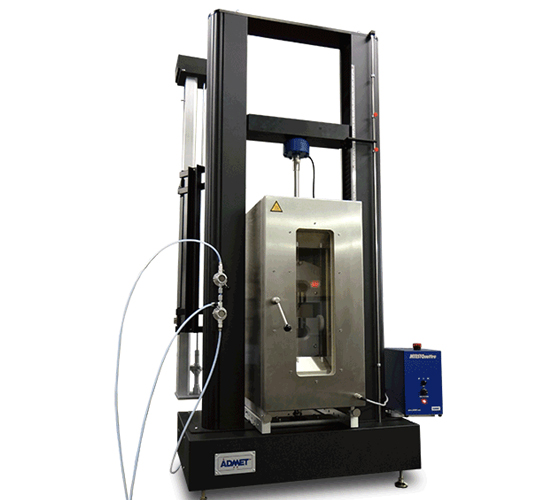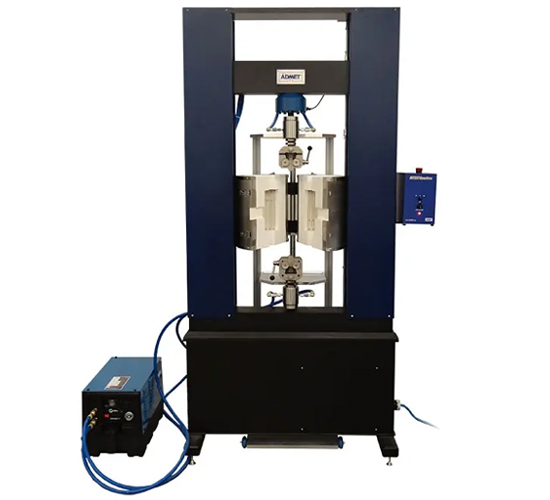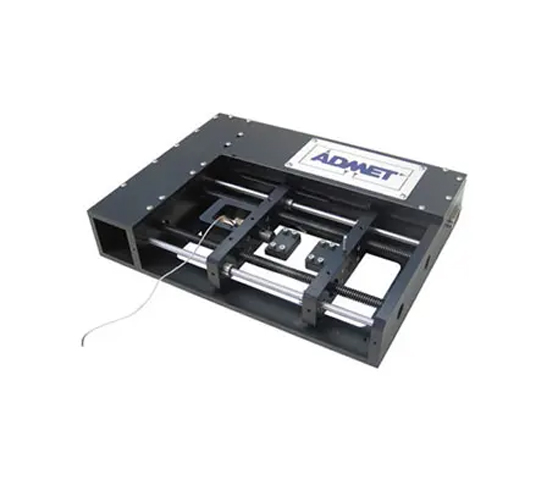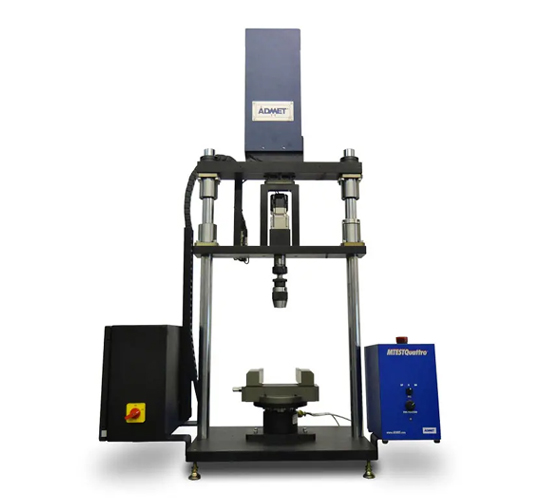Home / ADMET Planar Bi-Axial Universal Testing Machine
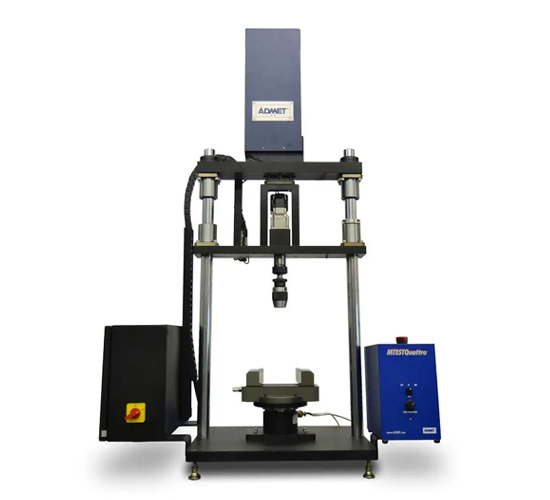
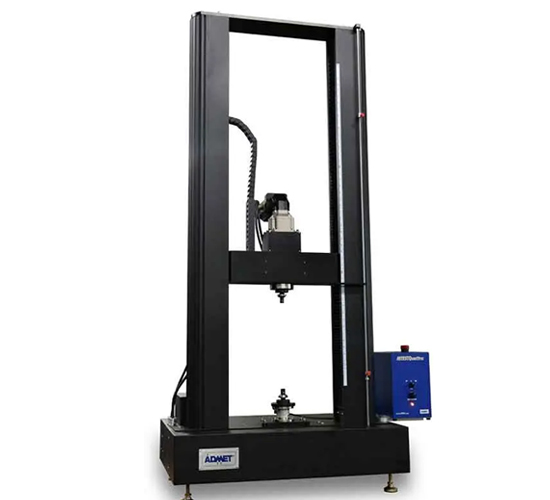
The ADMET eXpert 8000 Planar Biaxial Testing Machines are advanced universal testing machines designed for precise mechanical testing of biomaterials, elastomers, fiber-reinforced composites, films, plastic fabrics, and textiles. These machines are ideal for evaluating materials under various stress states, providing reliable and accurate results for a wide range of industries.
The eXpert 8000 systems are fully customizable to meet your specific testing requirements, including sample size, elongation, test speed, and force specifications. Whether you are analyzing anisotropic, hyper-elastic, or heterogeneous materials, these testing systems are engineered to deliver unmatched accuracy and repeatability.
Built with state-of-the-art technology, the eXpert 8000 ensures robust performance across stress and strain ranges, making it a preferred choice for research and development in advanced materials. These systems provide exceptional flexibility, allowing you to address complex material characterization with ease.
For businesses looking for high-performance testing equipment at a competitive universal testing machine price, the ADMET eXpert 8000 is the ideal solution. Contact ADMET today to learn more about these advanced testing machines and how they can support your material testing needs.
universal testing machine, universal testing machine price, planar biaxial testing machines, ADMET eXpert 8000, material testing systems, biomaterials testing, advanced material characterization, customized testing solutions.
ADMET Planar Bi-Axial Universal Testing Machine Overview
The ADMET Planar Bi-Axial Universal Testing Machine is a state-of-the-art system designed to perform simultaneous multi-axial tension or compression tests. This advanced testing machine is ideal for industries such as biomedical, aerospace, and materials research, where understanding the behavior of materials under complex, multi-directional stresses is essential.
The ADMET Planar Bi-Axial Testing Machine is a versatile and precise universal testing machine tailored for advanced research and development applications. For more details about its features and the universal testing machine price, contact ADMET today.
ADMET Planar Bi-Axial Universal Testing Machine Features
The ADMET Planar Bi-Axial Universal Testing Machine is a specialized testing system designed for precise and simultaneous application of two orthogonal forces (biaxial loading) to materials. This machine is ideal for testing materials and components that experience multi-axial stresses, such as textiles, composites, and biomedical materials.
Dual-Axis Load Application:
Wide Load and Torque Capacity:
Precision Load Cells:
Advanced Control Software:
Versatile Material Testing:
Customizable Fixtures and Grips:
High-Precision Actuators:
Durable and Robust Design:
Multi-Axial Stress Simulation:
Cost-Effective Bi-Axial Testing Solution:
This versatile machine is designed for performing both uniaxial and planar biaxial tests, including static and cyclic fatigue tests. It’s particularly suitable for testing materials and components in industries requiring precise multi-directional force measurements, such as aerospace, automotive, and biomedical fields.
The ADMET Planar Bi-Axial Universal Testing Machine is a specialized testing system designed to evaluate the mechanical behavior of materials subjected to orthogonal (two-directional) stress-strain fields. It is particularly useful for studying how materials respond to stress in two perpendicular directions simultaneously. This type of testing is crucial in industries where materials are under complex loading conditions, such as in biomedical, textiles, and film applications. Below are the key applications of this machine:
Biological Tissues:
Films and Coatings:
Textiles:
Composites and Membranes:
Medical Devices:
Packaging Materials:
Polymer and Elastomers:
The ADMET Planar Bi-Axial Universal Testing Machine is critical for evaluating the performance and behavior of materials that are subjected to complex, multi-directional stress fields, which is common in biological, textile, and advanced material applications.
The ADMET Planar Bi-Axial Universal Testing Machine is designed to apply both axial and lateral forces simultaneously to materials, allowing for testing in two different directions (bi-axial loading). This makes it ideal for evaluating complex material behaviors under multi-axial loading conditions, including tension, compression, and shear.
The ADMET Planar Bi-Axial Universal Testing Machine typically supports load capacities ranging from 5 kN to 100 kN or higher, depending on the configuration and application. This makes it suitable for both small and large-scale material testing.
The machine is commonly used in industries such as:
The ADMET Planar Bi-Axial Universal Testing Machine can perform:
This machine can test a variety of materials, including:
Key features include:
The ADMET Planar Bi-Axial Universal Testing Machine uses MTESTQuattro, which provides:
The accuracy for load measurements is typically within 0.5% of the applied load. Displacement accuracy is typically 0.1% of the total range, ensuring reliable and repeatable test results.
The crosshead speed is adjustable, typically ranging from 0.001 mm/min to 1000 mm/min, allowing for flexibility in testing materials at various strain rates.
The machine accommodates a range of specimen sizes depending on the configuration, but the test area typically supports materials with dimensions of up to 500 mm x 500 mm or more, depending on the fixtures and grips used.
Yes, the ADMET Planar Bi-Axial Universal Testing Machine is capable of performing cyclic loading and fatigue testing, making it ideal for applications where materials undergo repeated stress or strain.
Yes, the machine can be integrated with environmental chambers to simulate specific temperature, humidity, or other environmental conditions during testing, enabling testing under real-world conditions.
The machine supports a wide range of accessories, such as:
The machine operates on standard 220-240V AC or 110-240V AC, depending on the model and configuration.
Yes, routine calibration and maintenance are required to maintain the machine’s accuracy and reliability. ADMET provides support for calibration services and maintenance.
Yes, the ADMET Planar Bi-Axial Universal Testing Machine can be customized to meet specific testing needs, including custom load capacities, fixtures, software configurations, and test protocols.
The ADMET Expert 4000 Series is a compact, micro universal testing machine designed for low-force material testing applications. It is ideal for testing small specimens, thin materials, and micro-components.
The warranty typically ranges from 1 to 2 years, with options for extended coverage. This typically includes both parts and labor, depending on the terms of the warranty.
Yes, ADMET offers comprehensive training, including installation, setup, and user guidance, along with ongoing technical support to ensure proper machine operation.
